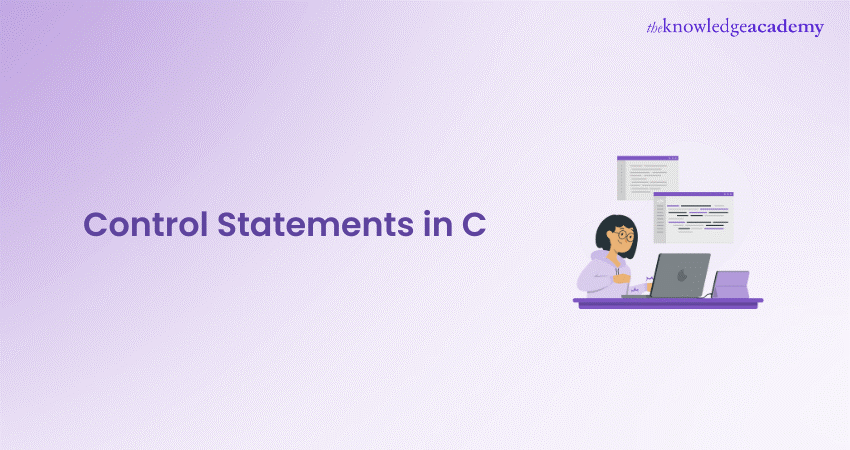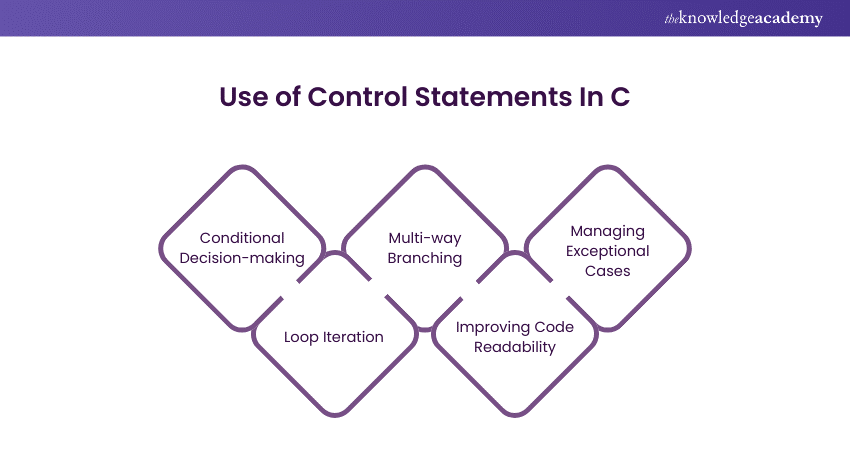We may not have the course you’re looking for. If you enquire or give us a call on +44 1344 203 999 and speak to our training experts, we may still be able to help with your training requirements.
Training Outcomes Within Your Budget!
We ensure quality, budget-alignment, and timely delivery by our expert instructors.

Do you want to build a career in C Programming? Understanding Control Statements is essential for directing program flow effectively, making it more responsive and dynamic. This blog will guide you through the fundamentals of Control Statements in C and show how they optimise code.
These programming tools are indispensable for making decisions using 'if-else' statements. Let's dive into mastering Control Statements and elevate our programming skills.
Table of Contents
1) What Are Control Statements in C?
2) Why Do We Use Control Statements In C Programs?
3) Different Types of Control Statements in C
a) Decision-Making Control Statements in C
b) Loop Control Statements in C
c) Conditional Control Statements in C
d) Goto Statements in C
4) Conclusion
What Are Control Statements in C?
In the C Programming Language, Control Statements enable systems to perform pre-defined logical instructions. They also decide whether to follow the set of statements or not. Control Statements are extremely important for giving the right direction to the program's flow and enabling conditional executions.
Through Control Statements in C, programmers can create responsive and dynamic applications using ‘if-else’ and ‘switch’ statements. These statements also help in decision-making and controlling program sequence, making sure only the right code gets executed. Control Statements give programmers flexibility to create effective and efficient applications.
Why Do We Use Control Statements In C Programs?
Control structures are vital to C programming, enabling developers to direct the execution flow according to requirements. These expressions are necessary for decision-making, reiterating tasks, and controlling a program's reactions to various scenarios. Here is how Control Statements improve the writing of C programs:

1) Making Decisions with Conditional Control Statements
Conditional Control Statements such as ‘if’ and ‘switch’ allow programmers to determine actions based on certain conditions. These statements provide the option for branching, allowing the program to take different paths based on the condition's result. The capacity to implement logic and generate dynamic behaviour is essential for flexible and adjustable programming.
2) Iterating with Loop Control Statements
Loop Control Statements like ‘for’, ‘while’, and ‘do-while’ are utilised to iterate through a block of code repeatedly until a specific condition is satisfied. These loops are essential for managing tasks that need to be repeated, like handling data sets, input reading, or calculations. By utilising loops, coders can prevent repeating code and simplify processes, enhancing the code's efficiency and adaptability.
3) Multi-Way Branching
The switch statement allows for branching in multiple ways depending on the expression's value. This is especially handy in cases with various possible results where distinct measures are required for each. It streamlines the code and facilitates handling different scenarios.
4) Enhancing Code Readability and Maintainability
Control Statements make the code more readable and maintainable, contributing significantly to the C language. By clearly showcasing the intended logic, these statements make it simple for developers to understand the program's flow. This coherence is essential for debugging and collaborative work; an organised code is easier to follow and modify.
5) Handling Exceptional Cases with Control Statements
Control Statements such as break and continue offer mechanisms to carry out exceptional cases and change the normal flow of execution. They allow programmers to exit loops early, skip specific iterations, or jump to specific parts of the code. This flexibility is vital for sustaining an unusual situation, validating inputs, or implementing error-handling routines correctly.
Control Statements in C are mandatory tools that help developers create more intelligent and efficient program. Thus, ultimately giving better solutions.
Don’t miss out! Sign up for our C Programming Courses and build a strong foundation in coding. Register now and get started!
Different Types of Control Statements in C
In C Programming Language, you will find different types of Control Statements. Let’s explore each of these statements in the following sections:
1) Decision-Making Control Statements in C
a) If Statements
The if statement checks a condition and executes the code block inside if the condition is proper.
|
#include int main() { int number = 10; if (number > 5) { printf("The number is greater than 5.n"); } return 0; } |
b) If-Else Statement
The if-else statement provides an alternative path when the if condition is false.
|
#include int main() { int number = 3; if (number > 5) { printf("The number is greater than 5.n"); } else { printf("The number is not greater than 5.n"); } return 0; } |
c) Nested If-Else Statements
Nested if-else statements allow for more complex decision-making by including multiple if conditions within each other.
|
#include int main() { int number = 15; if (number > 10) { if (number < 20) { printf("The number is between 10 and 20.n"); } else { printf("The number is 20 or more.n"); } } else { printf("The number is 10 or less.n"); } return 0; } |
d) Else-If Ladder Statements
The else-if ladder allows checking multiple conditions in sequence.
|
#include int main() { int score = 85; if (score >= 90) { printf("Grade: An"); } else if (score >= 80) { printf("Grade: Bn"); } else if (score >= 70) { printf("Grade: Cn"); } else if (score >= 60) { printf("Grade: Dn"); } else { printf("Grade: Fn"); } return 0; } |
Elevate your coding skills with our C++ Programming Course and become a master- join now!
2) Loop Control Statements in C
Loop Control Statements in C enable programmers to perform a block of code multiple times. Here are some of them:
While Loop
The ‘while’ loop continues if the given condition remains true. The loop may not run if the condition is false initially, as it is checked before each iteration.
|
#include int main() { int count = 1; while (count <= 5) { printf("Count is %dn", count); count++; } return 0; } |
Do-while Loop
Like the while loop, the ‘do-while’ loop checks the condition after executing the body of the loop, guaranteeing the loop will run at least once.
|
#include int main() { int count = 1; do { printf("Count is %dn", count); count++; } while (count <= 5); return 0; } |
For Loop
The ‘for’ loop is mainly used when the iterations are precise. It has three parts: initialisation, condition, & increment/decrement.
|
#include int main() { for (int i = 1; i <= 5; i++) { printf("Iteration %dn", i); } return 0; } |
These snippets have shown the use of Loop Control Statements in C, which allows for the careful handling of repetitive tasks.
Start your journey into C language with our C Programming Course today!
3) Conditional Control Statements in C
These statements offer a systematic approach to managing various possible results in a program, improving its adaptability and clarity.
|
#include int main() { int grade = 'B'; switch(grade) { case 'A': printf("Excellentn"); break; case 'B': printf("Goodn"); break; case 'C': printf("Averagen"); break; case 'D': printf("Poorn"); break; default: printf("Invalid graden"); break; } return 0; } |
4) Goto Statements in C
The Goto Statement transfers the control flow to a specific point in a program, making it a type of jump control statement. It directs the program to a labelled section, allowing immediate branching to that part of the code.
|
#include int main() { int number = 3; printf("Checking number...n"); if (number < 0) { goto negative; } printf("Number is positive or zero.n"); goto end; negative: printf("Number is negative.n"); end: printf("End of program.n"); return 0; } |
Conclusion
We hope you have learned the Control Statements in C well. These essential tools are crucial for helping your programs' execution flow. You can craft efficient, readable, and maintainable code by mastering constructs like if, else, switch, loops, and jump statements. Following best practices ensures that Control Statements improve your development process rather than complicate it. As with any programming concept, proficiently using Control Statements effectively in C comes with training and experience.
Unlock your potential with our C# Programming Course and expand your skills- Register now!
Frequently Asked Questions

You can utilise ‘if’ statements inside a ‘for’ loop. It enables programmers to execute conditional checks during iteration. Thus, complex logic can be used within the loop.

Yes, you can nest Control Statements in C. For example, use ‘if’ statements within the ‘for’ loop to make complex decisions.

The ‘switch’ statements identify a variable in multiple cases. When it is identified, the code related to it is executed. In case it’s unavailable, the system runs the ‘default’ case.

The Knowledge Academy takes global learning to new heights, offering over 30,000 online courses across 490+ locations in 220 countries. This expansive reach ensures accessibility and convenience for learners worldwide.
Alongside our diverse Online Course Catalogue, encompassing 17 major categories, we go the extra mile by providing a plethora of free educational Online Resources like News updates, Blogs, videos, webinars, and interview questions. Tailoring learning experiences further, professionals can maximise value with customisable Course Bundles of TKA.

The Knowledge Academy’s Knowledge Pass, a prepaid voucher, adds another layer of flexibility, allowing course bookings over a 12-month period. Join us on a journey where education knows no bounds.

The Knowledge Academy offers various C Programming, including the C Programming Course, C++ Programming Course, and Introduction Of Embedded C Programming Course. These courses cater to different skill levels and provide comprehensive insights into C vs Java.
Our Programming & DevOps Blogs cover a range of topics related to Programming & DevOps, offering valuable resources, best practices, and industry insights. Whether you are a beginner or looking to advance your Programming & DevOps Skills, The Knowledge Academy's diverse courses and informative blogs have got you covered.
Upcoming Programming & DevOps Resources Batches & Dates
Date
 C Programming
C Programming
Thu 19th Dec 2024
Thu 23rd Jan 2025
Thu 20th Mar 2025
Thu 22nd May 2025
Thu 17th Jul 2025
Thu 18th Sep 2025
Thu 20th Nov 2025







 Top Rated Course
Top Rated Course



 If you wish to make any changes to your course, please
If you wish to make any changes to your course, please


